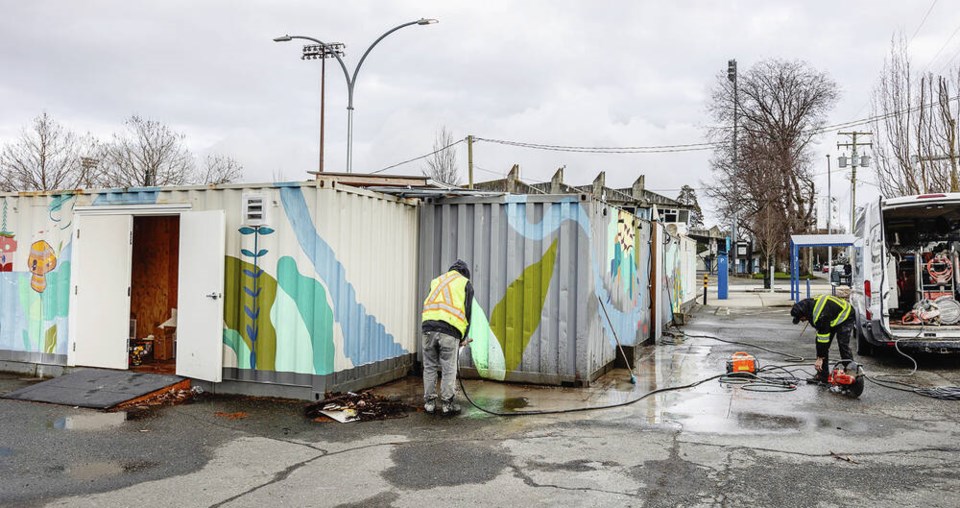As some neighbours worry reopening of a shipping-container community next to Royal Athletic Park will bring increased crime, police data show declining calls for service to the former supportive-housing community on the site.
Annual calls for service to the 30-unit community dubbed Tiny Town — which opened in April 2021 on the Royal Athletic Park parking lot — and the immediate area around it dropped from 592 calls in 2021 to 422 in 2022 and 382 in 2023.
The data are for an area bordered by Quadra Street to the west, North Park Street to the south, Cook Street in the east and Pembroke Street to the north. Service requests include calls about an unwanted person, a disturbance, a wellbeing check, assisting fire or ambulance and suspicious person or circumstances.
Tiny Town was established as a temporary home for people while more permanent units were being built.
It was created with shipping containers with funding from local donors and businesses and partnerships with B.C. Housing and the City of Victoria. The village at 940 Caledonia Ave. was operated by Our Place Society.
The last residents moved into permanent housing before Tiny Town shut down last fall.
When the province announced in late February the 30-unit village would reopen and operate until at least September 2025, some neighbours expressed concern that it would bring increased crime. Renamed Caledonia Place, it’s expected to reopen in mid-March.
Coun. Stephen Hammond said he heard from a nearby resident that there had been fewer incidents since the community closed and its reopening was the “worst news.”
The police data does not reflect the experience of neighbours, who have built fences and gates and installed security cameras in response to people rummaging in their yards and stealing items, he said. One couple was awoken in the night to a man standing at the end of their bed shining a flashlight, he said.
“Many of these people haven’t called police for a long time, so it doesn’t turn up in police stats,” Hammond said.
Mayor Marianne Alto said the data are interesting but numbers only show part of the picture.
“This is all based on the fact that people make calls about different things that are disturbing, and that’s very subjective,” she said, noting she’s hearing mixed responses from the neighbourhood about the opening of a new community on the site.
Bharat Chandramouli, a board member for the North Park Neighbourhood Association, said there are so many variables with respect to the police data, the board isn’t sure what to make of the numbers. The association has also heard from residents who are supportive of the shipping-container community reopening and those opposed, he said.
Heidi Hartman, associate vice-president of supportive housing and homelessness at B.C. Housing, said Caledonia Place will house people who have already been staying in shelters, possibly on a long-term basis, so they’re already connected to services and ready to move into more permanent housing. That will free up space in shelters for people currently living on the street or in parks, she said.
A downward trend in calls for service to the area around Tiny Town speaks to the development of a stable community, she said. “Well-managed sites with the appropriate supports and services can really successfully integrate well into communities because they’re their own community as well, and these are their homes.”
The average number of calls for service in the area over a 10-year period is 397, putting the totals in 2021 and 2022 above the average, according to information provided by VicPD.
The calls cannot be definitively connected to Tiny Town residents, said VicPD spokesperson Cheryl Major, and the number of calls does not necessarily relate to crime, as calls for an unwanted person or a wellbeing check are often not criminal in nature. The calls are categorized based on the information provided by a caller, she said.
“It’s important to remember that a single individual conducting criminal activity, such as theft from a vehicle, or a single household with disturbing activity, such as domestic violence, can cause a large change in overall call volume and types of calls over a short period of time,” she said.
Major said the police department supports the reopening of a managed supportive-housing facility on the parking lot. VicPD recognizes neighbours’ concerns about the project and is committed to working closely with operators and the neighbourhood association to address safety concerns, she said.




